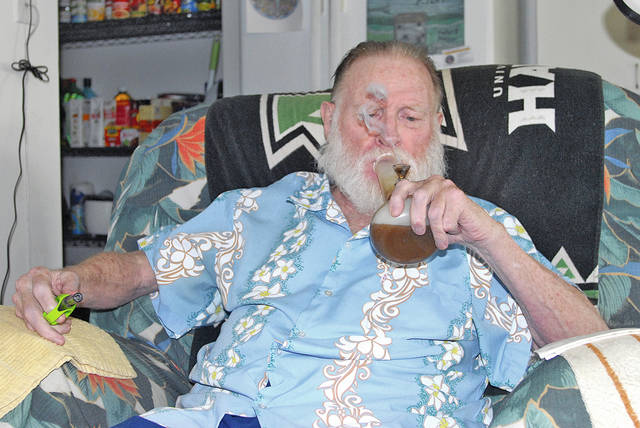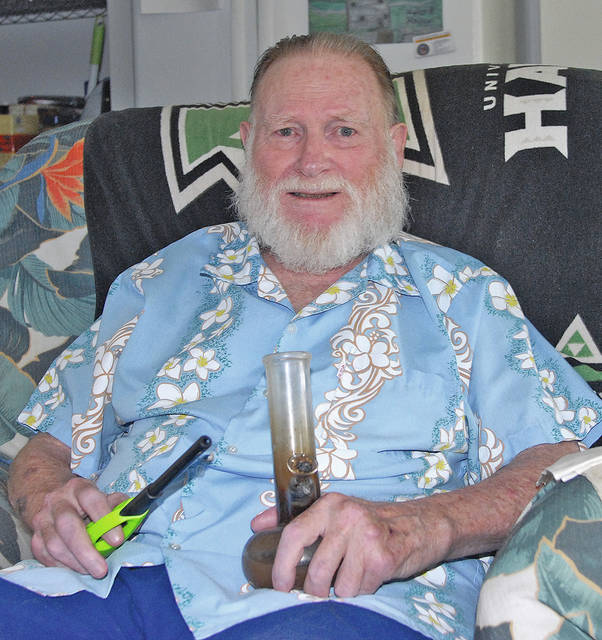KEALAKEKUA — A 3rd Circuit Court judge Thursday dismissed a lawsuit filed by a Kapaau man fighting his housing project’s new prohibition on smoking medical marijuana on the property. ADVERTISING KEALAKEKUA — A 3rd Circuit Court judge Thursday dismissed a
KEALAKEKUA — A 3rd Circuit Court judge Thursday dismissed a lawsuit filed by a Kapaau man fighting his housing project’s new prohibition on smoking medical marijuana on the property.
“It’s ludicrous,” said Lanric Hyland of the judge’s ruling, adding that he plans to appeal it.
Hyland filed suit against the county Office of Housing and Community Development and others in May, saying that a recent rule adoption at Ainakea Senior Residences denied the man his constitutional and civil rights.
The rule, announced at a community meeting in March and scheduled to take effect this past June, enacted a no-smoking policy on the entire premises except in a designated smoking area.
The policy covered cigarettes, electronic cigarettes and medical marijuana. But, the rule said, residents smoking medical marijuana would be required to leave the entire property.
Hyland, citing the state’s constitution, argued the rule goes too far.
“Under medical supervision, I have a right to take the legal medicine of my choice,” he told the court Thursday during oral arguments.
But before the case could move forward, Hyland needed to prove that he had standing to bring the case to the judge. The county and other defendants in the case argued Hyland hadn’t done that and, in the end, Judge Melvin Fujino agreed.
To establish standing, a defendant needs to prove three things, the first of which being that the plaintiff suffered actual or threatened harm from the change in policy.
Hyland argued he had, saying the rule change threatens him with homelessness if he doesn’t comply with the no smoking policy, citing court precedence that said medical marijuana rules were meant to ensure those who are seriously ill aren’t penalized for using medical marijuana.
“Am I not being penalized, your honor, by defendants’ threats to make me homeless if I use my medical marijuana in the privacy of my own home?” he asked the court.
But Deputy Corporation Counsel Kaena Horowitz said Hyland is still free to use medical marijuana, he just can’t smoke it.
“The Hawaii Legislature may have granted plaintiff the ability to use marijuana, but he does not have the right to smoke it,” he wrote in his motion to dismiss the complaint.
Horowitz said that while the new rule bans smoking at the residence, smoking isn’t the only way to consume marijuana.
Instead, the attorney said, the man still can use marijuana through other means, “such as pills, liquids or sauteing it in oil and using said oil to bake brownies, cookies or other delectable, edible forms,” he wrote.
None of those options, he added, would run afoul of the no-smoking rule and all would let Hyland use marijuana for medical purposes.
In response, Hyland argued that “smoking is the commonly understood way for cannabis to be used,” particularly without any dispensaries making it available in other forms.
Hyland also said that rather than him having to change his usage, it should be on the county to justify rules against smoking.
“What (the Office of Housing and Community Development) has failed to cite is any authority whatsoever as to why the use of marijuana would not include smoking it, and what authority would justify defendants from forbidding it,” he wrote in his response to the motion to dismiss.
Fujino though ultimately agreed with the defendants, saying that Hyland has other options aside from smoking medical marijuana.
Even under the law permitting medical marijuana, the judge said, the law doesn’t allow the use of medical marijuana if it puts another person’s life or health at risk.
As an example, he asked Hyland whether he believes it would be OK to smoke marijuana if he had a child with asthma living with him.
Hyland, though, said it was “an immaterial question,” as there are no children living at his residence.
“He asked me what I would do in a mythical case,” Hyland said after the hearing, adding that the judge “invented a child who was going to live in my apartment.”
“I don’t understand what he was talking about,” he added.
As for the point of using medical marijuana in a way other than smoking it, Hyland pointed to a lack of dispensaries or other facilities that distribute medical marijuana in edible forms.
“What else is there if you can’t smoke it,” he asked.




